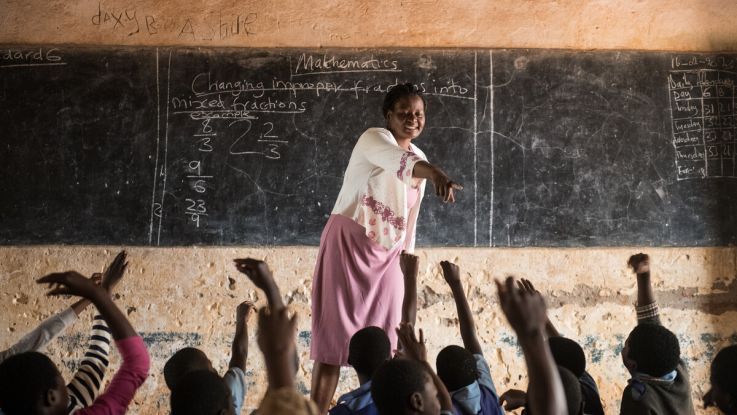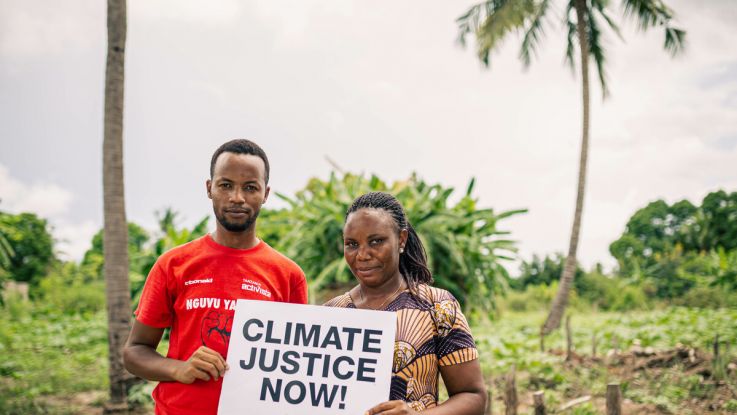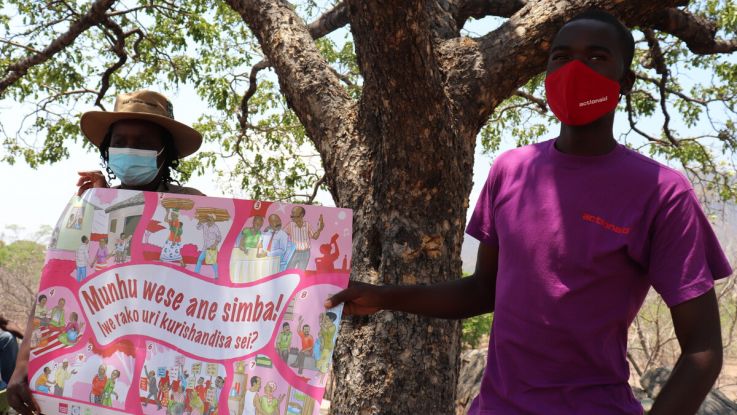The real stories that inspired One Girl’s Journey
22 October 2018
One Girl’s Journey, our new short film, is inspired by the experiences of women and girls we work with in Africa, Asia and Latin America.
One Girl's Journey is shot entirely from the perspective of Grace, a girl growing up in Ghana. Following Grace through key moments of her childhood, the film demonstrates how we support women and girls living in poverty as they tackle the challenges of their everyday lives.
Every scene of the film – from Grace being shamed for having her period, to avoiding an abduction attempt on the way to school – is a true reflection of the issues they face and the work we do to change lives, for good.
In keeping with ActionAid’s unique, community-led approach, it was essential that our film had the full involvement of women and girls who benefit from our work. In Ul-Kpong, in the Upper West region of Ghana, our local staff and the community were keen to act, help direct and assist with logistics.
“Having that local insight was really important,” says our videographer Lyle Lindgren, who directed One Girl’s Journey. "By working closely with the community in Ghana we ensured that all the scenes were true to life and reflected girls’ experiences.”
The world through Grace's eyes
Four girls from the community – Janet, Eunice, Mary and Naomi – portray Grace at different ages. In order to show life through Grace’s eyes, the whole film was captured using a handheld camera.
The footage was then remotely manipulated by a specialised focus puller to replicate the way the human eye perceives objects in the foreground and distance.
Seven-year-old Eunice plays Grace at primary school, a scene that reflects ActionAid’s work to ensure all girls receive a quality education. Eunice's mother, Elizabeth, is a teacher at a local school that ActionAid helped build four years ago.
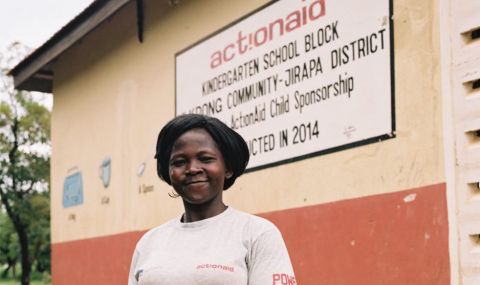
Elizabeth's daughter, Eunice, was one of the four girls who played Grace in One Girl's Journey. Elizabeth works as a teacher in a school ActionAid helped set up. . Photo: Ahmet Husseyin/ActionAid
"Before this building was here, some children didn't want to come to school," she says. "Now we always have enough students inside."
Eunice (and classmate Vivian) also star in the scene that makes reference to our longstanding child sponsorship programme. Since its launch in the 1970s, thousands of girls and their communities have benefited from being sponsored.
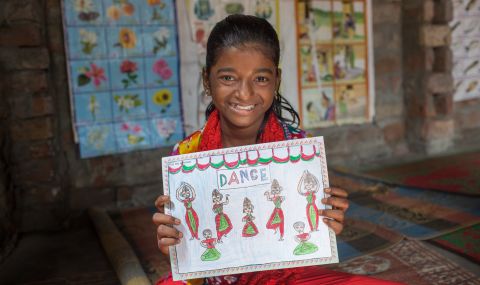
Jharna, 11, who grew up in a slum in Bangladesh, now attends school. . Photo: Turjoy Chowdhury/ActionAid
One of these girls is 11-year-old Jharna, who grew up in a slum in Dhaka, Bangladesh’s capital.
Jharna, who was sponsored through ActionAid, now attends school every day. Her whole community has benefitted from the opening of an ActionAid children's centre, where kids can do their homework, socialise and learn about their rights.
Women taking charge
Grace (played here by 12-year-old Mary) then witnesses the aftermath of a humanitarian emergency. ActionAid staff members can be seen distributing food and water, with women leading the response. This reflects our approach to support and promote women’s leadership when disaster strikes.
In the aftermath of Hurricane Matthew in Haiti in October 2016, ActionAid supported women to be leaders at all levels of the response, from female civil engineers to local community leaders who distributed emergency supplies.
Women like Marie-Andree of ActionAid Haiti also helped distribute these supplies, which included food, clean water and sanitary products.
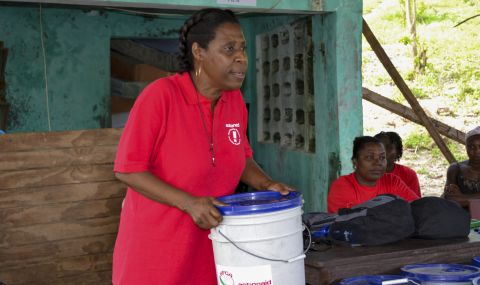
Marie-Andree of ActionAid Haiti distributes emergency kits in the aftermath of Hurricane Matthew. Photo: ActionAid
Grace faces period shaming
ActionAid’s work fighting period stigma is reflected in the film, when Grace realises blood from her first period has leaked onto her skirt – and is teased for it by her fellow pupils.
Despite periods being a perfectly natural part of most women’s lives, girls around the world experience period shaming each month and lack access to essential sanitary products. ActionAid has been working with communities to help girls access sanitary products and tackle period stigma, and has helped build period safe spaces in schools.
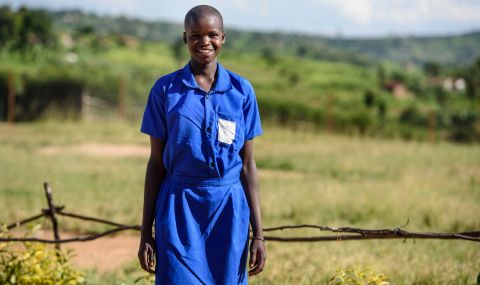
Thanks to the ActionAid-built safe room at her school in Rwanda, Jeanne, 14, can keep learning during her period instead of being forced to stay at home. Photo: Jennifer Huxta/ActionAid
“Previously we would miss school when we had our period, maybe for three to four days,” says Jeanne, 14, from Nyanza, Rwanda. “Now this room is here it really helps us; we come here, we shower, we use sanitary products, then we go back to class.”
Ending violence against women and girls
Our work ending violence against girls is also referenced in the short film. In Ghana, child marriage rates are high and women and girls face kidnapping for marriage on their way to school. To counter this, ActionAid has formed and trained COMBAT squads across the country.
These squads teach girls about their rights, rescue girls who have been abducted, report cases to the police and – as depicted in the film – provide girls with bikes so that they can get to and from school safely.
Local ActionAid worker Abiba runs 57 COMBAT squads in northern Ghana. Together, these squads have helped rescue more than 160 girls from abduction over the last five years and prevented many more kidnappings from taking place through their awareness-raising efforts. “We show people that to marry a girl below 18 is a crime,” she says.
Abiba makes a special appearance towards the beginning of One Girl’s Journey, where she delights Grace and other schoolchildren by introducing them to a baby goat.
We show people that to marry a girl below 18 is a crime."
The scene represents ActionAid’s work to economically empower women. For decades, we have helped provide women and their families with goats and pigs so they can earn an independent living.
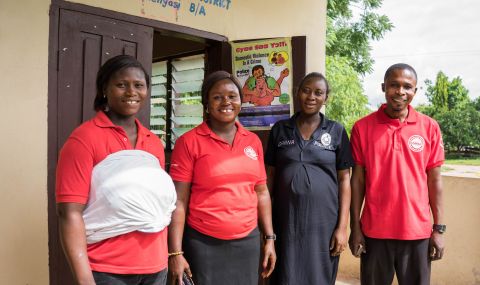
Members of a COMBAT squad in Kumasi, Ghana. COMBAT members also support girls to go back to school after an abduction or attempted abduction. . Photo: Nana Kofi Acquah/ActionAid
Real stories, real people
The final shot of One Girl’s Journey shows Grace, now played by 21-year-old Naomi, looking at herself in the mirror before grabbing hold of an ActionAid T-shirt.
Naomi, who is training to be a teacher in Ghana, joined an ActionAid girls’ club aged six, where she was taught about her rights.
“Before I joined ActionAid I thought the place of a girl was in the kitchen,” she says. “Through the club I learned that ladies have the power to do other things. If I hadn’t joined the girls’ club I would be married by now, but because I joined the club I now have a future.”
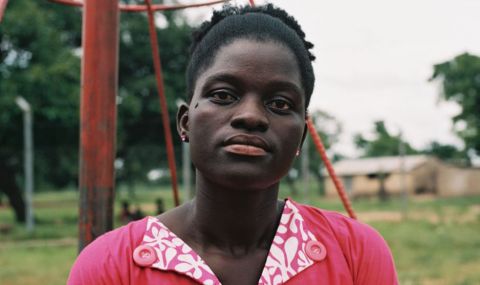
Naomi, 21, is one of the four girls who played Grace in One Girl's Journey. She is training to be a teacher in Ghana. Photo: Ahmet Husseyin/ActionAid
If I hadn’t joined the ActionAid girls’ club I would be married by now."
Girls like Naomi are resourceful and determined – and with the right opportunities, they can change the world. But there are still many barriers that hold them back.
At ActionAid, we won’t stop until every single girl has the opportunity to fulfil her full potential.
Do you feel inspired by One Girl’s Journey? Share this blog to help raise awareness about our work, and find out more about ActionAid's work with women and girls around the world today.
Read next
-
The links between gender-based violence and the economy
11 December 2023
-
Climate crisis: whose responsibility?
21 June 2023
-
Fathers: let’s discuss how to raise our sons
16 June 2023

